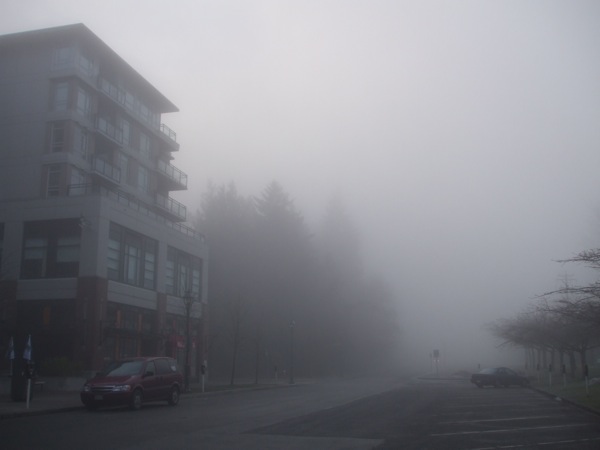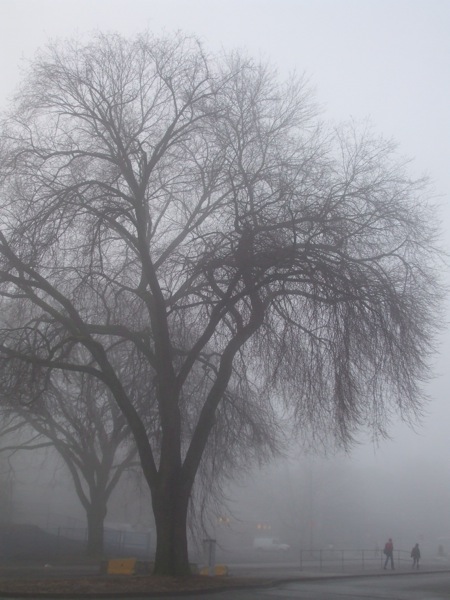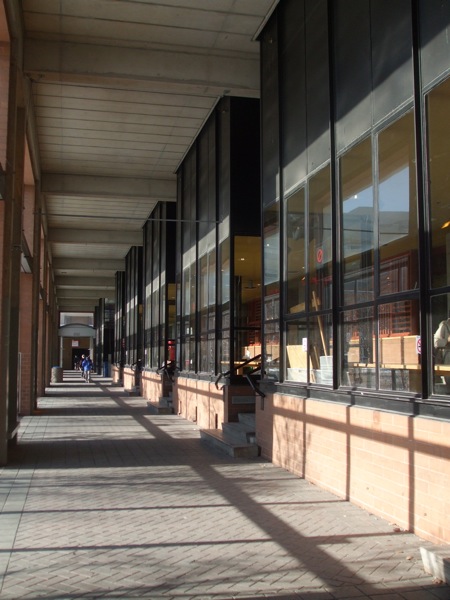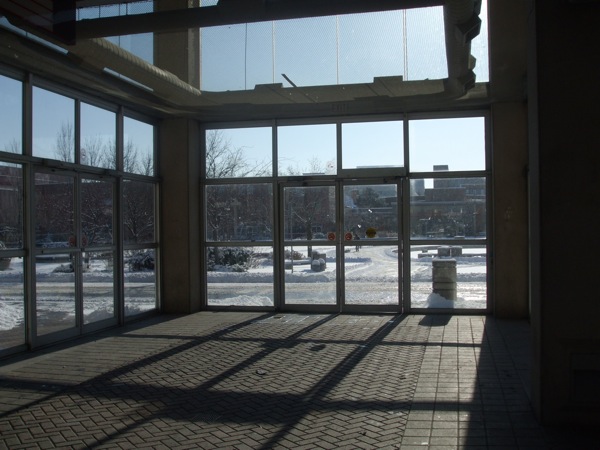In my visits to other cities, I’ve noticed how much the weather can affect my experience of the place. Whether it was the floods in Venice, the heavy constant cloud over London, or the oppressive humidity of Toronto, my enjoyment of the city is directly related to my ability to get out and comfortably walk around. Naturally it’s easier to wander or meet up with friends if the weather is nice. And there are also the everyday realities of taking the bus in bad weather (it’s more crowded, and the windows invariably fog up, something that doesn’t seem to happen on streetcars or subways).
Waking up to the eighth day of fog in a row this morning assured me that fog also affects our perceptions of the city. I was struck by how isolated UBC campus looks with the heavy fog. Some of my photos could easily have been taken in the countryside…which is actually fitting, as UBC is rather isolated from the rest of Vancouver. At the same time, the fog actually made the campus look more picturesque than usual because it smoothed out a lot of the torn up streets, potholed sidewalks and modernist architecture that seems to characterize the place.
While the campus is located on a peninsula, surrounded on three sides by water, it takes some effort to actually see the ocean. It is only visible from the end of Main Mall, and otherwise accessible from several steep paths along the beach (around 250 steps down). The fog is a visual and sensory reminder that we are actually right on the ocean, and the foghorn that sounds regularly adds to this effect.
It is surprising how little we consider the weather when we plan our cities, particularly in Canada. What with the snow in Edmonton, Calgary, Toronto, Ottawa, Montreal, and Halifax you’d think we’d have nice wide boulevards for snow storage, but we don’t. Not to mention the lack of nice broad overhangs for the Vancouver rain (which Seattle, just across the border, seems to have figured out). Luckily, most of our cities have excellent tree cover for the hot summers. I’ve read one book on designing for winter cities (Norman Pressman), but it doesn’t seem that his ideas have filtered down into better building and infrastructure design to help us accommodate our weather. While some aspects of weather (such as fog) are unpredictable, the seasons are not. One notable anomaly is York University campus in Toronto, where there is a real acknowledgement of the very snowy conditions there (a couple of feet while I was there). The central boulevard where buses come in from Downsview subway station is framed by buildings with internal walkways. The walkways included indoor bus waiting areas (similar to those at Eglington subway station) allowing students to move around the main area of the campus and still be protected from snow and cold temperatures. I’m sure there are lots of designers out there who don’t like this idea (I seem to remember proposing a covered walkway way back in my studio days and being shot down), but I thought it worked really well.
We need more than the winter festivals in Ottawa and Quebec City, or the Cherry Blossom Festival in Vancouver. Like multicultural festivals, these are merely token celebrations that do little to integrate different elements into our cities’ social and physical structures. Buildings and infrastructure designed to protect us from the elements might even have the pleasant side effect of making us appreciate our seasons. Occasionally, weather has become a defining feature of a city; those of us who live in Vancouver are familiar with the obsession about rain, since it seems to rain every time our friends and family come to visit! If we had more covered walkways, broad overhangs and stores selling rubber boots, maybe it wouldn’t be so noticeable. Of course, Vancouverites would never buy those boots; they prefer thin canvas shoes that let the water right in!




